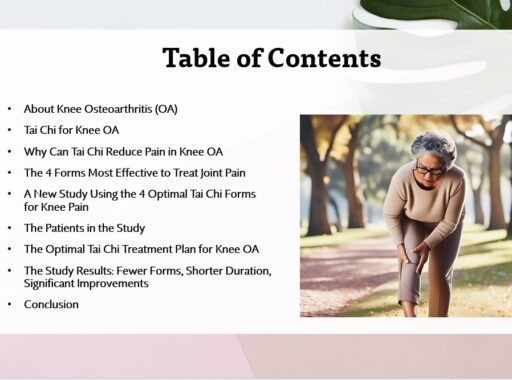Discovering the Power of Optimized Tai Chi
Tai Chi is widely recognized for its numerous health benefits, including pain reduction in individuals with knee osteoarthritis (OA). However, previous studies have shown inconsistent results, likely due to the varied selection of Tai Chi forms.
To address this, researchers have identified 4 optimal Tai Chi forms (OTC) specifically effective to minimize knee joint load and reduce pain.
A recent pilot study has provided further evidence of the effectiveness of these OTC forms in alleviating knee pain in individuals with knee OA. The study was done by scientists from Georgia State University, University of Texas Health Science Center at San Antonio, University of South Alabama and University of California, San Diego.

A tutorial with details is available for ATCQA Members and Certified Instructors/Practitioners.
Study Overview
The pilot study recruited fifteen participants diagnosed with knee OA. To measure the effectiveness of the OTC forms, participants rated their knee joint pain using the Visual Analogue Scale (VAS) before and after a two-week OTC training program. This short but intensive training aimed to provide immediate and measurable relief from knee pain.
Key Findings
Significant Pain Reduction
The results of the study were remarkable. After just two weeks of practicing the four OTC forms, participants reported a significant reduction in knee pain. The median pain score decreased from 5 cm before training to 1 cm post-training. This substantial decrease highlights the potential of the OTC program to provide rapid and effective pain relief for individuals suffering from knee OA.
Enhanced Effectiveness
Interestingly, the OTC program appears to be about 50% more effective in reducing knee pain compared to existing Tai Chi-based programs. Traditional programs, which typically use over 10 Tai Chi forms over 12 weeks, resulted in a pain reduction score of 1.06 in Hedge’s g. In contrast, the OTC program achieved a score of 1.59, demonstrating its superior efficacy in a shorter time frame.
Conclusions
The pilot study’s findings reveal that a two-week, four-form-based OTC program can significantly reduce knee pain in individuals with knee OA.
This innovative approach not only offers rapid pain relief but also shows greater effectiveness than traditional Tai Chi programs. These promising results suggest that the OTC program could be a valuable addition to pain management strategies for knee OA patients.
Looking Forward
The success of this pilot study paves the way for further research and the development of OTC-based knee pain reduction programs. Future clinical trials will be essential to establish the effectiveness, safety, and dose-response relationship of OTC in easing knee OA pain. As more evidence emerges, optimized Tai Chi may become a standard, non-invasive treatment option for knee OA, offering hope and relief to many.